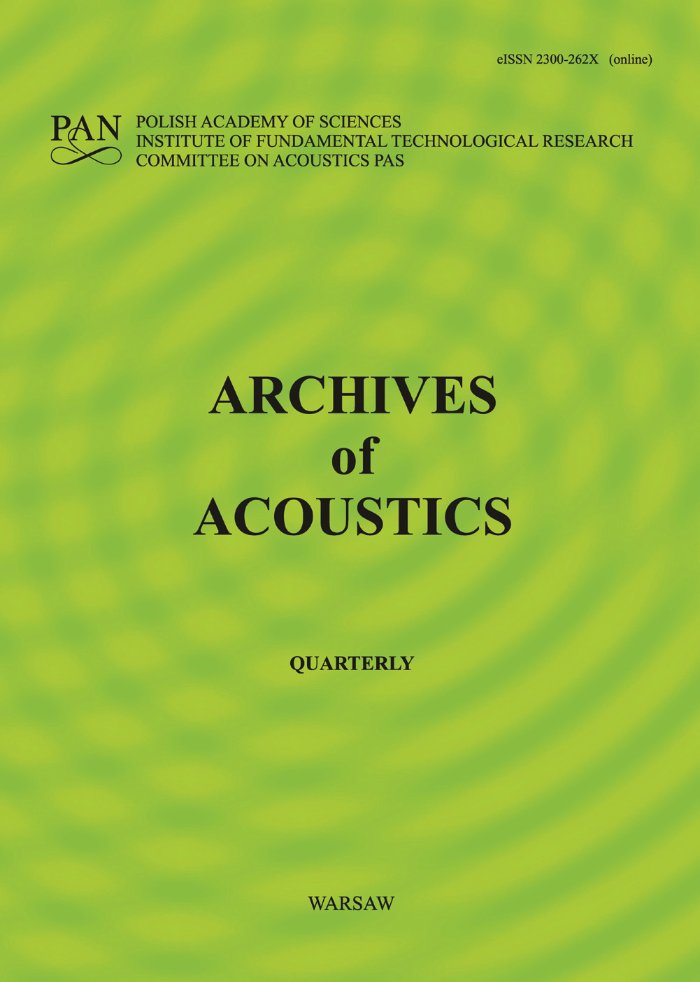Abstract
The steam turbine blades of low pressure stages are endangerd by the high-cyclic fatigue due to the combined loading of dynamic stresses by the steam time-variant pressure and the pre-stress from centrifugal forces. Therefore, the importance of their experimental dynamic analysis in the design stage is critical. For laboratory tests of the blades, the piezo actuators placed on the blades, unlike electromagnets placed in the stationary space, give a possibility to excite the flexural vibration of the blades within the bladed disk by time continuous forces independently of the rotor revolutions. In addition, the piezo actuators can be also used to control the vibrations of the blade. Therefore, several dynamic experiments of the clamped model blade equipped with PVDF films were performed for the force description of the piezo foils and their behavior as actuators of the blade vibration. The numerical beam models were used for numerical analysis of the vibration suppression effects both by additional parametric excitation and by active damping. The optimal phase shift of piezo actuator voltage supply was ascertained both for amplitude amplification and suppression. The results contribute to the knowledge of the actuation and active damping of blade vibration by the piezo elements.Keywords:
vibration suppression, parametric antiresonance, active damping, PVDF filmsReferences
1. Augustyn E., Kozien M.S. (2014), A Study on Possibility to Apply Piezoelectric Actuators for Active Reduction of Torsional
Beams Vibrations, ACTA PHYSICA POLONICA, 125, 4A, pp. A164-A168.
2. Bell A. J. (1993) Multilayer ceramic processing, Ferroelectric Ceramics, Birkhäuser Verlag, Basel, 241-271.
3. Horáček J., Veselý J., Pešek L., Vohradník M. (2004), Fundamental dynamic characteristics of humal skull, Engineering Mechanics, 11, 2, pp.139-158.
4. Nader M., Berger W. (2013), Applications of piezoelectric patches for active noise and vibration reduction or generation,
Proceedings of 6th ECCOMAS Conference on Smart Structures and Materials, 11 pages, 2013, Turin.
5. Nordman R. (2005), Mechatronic systems in Machinery I., [in German:] Mechatronische Systeme im Maschinenbau I. ,
Shaker-Verlag, Darmstadt.
6. Measurement Specialties, Inc, DT Series Elements (www.meas-spec.com).
7. Pešek L., Půst L., Bula V., Vaněk F. Název (2012), Inter-slip damping of twisted blades in opposed bundles under
rotation, Proceedings of 10th International Conference on Vibrations in Rotating Machinery, Woodhead Publishing
Limited Book, pp. 293-302, London.
8. Pešek L., Vaněk Fr., Půst L., Bula L, Cibulka J. (2010), Testing of dynamics of blade wheel with double periodicity,
Engineering Mechanics, 17, 3/4, pp.237-250.
9. Pešek L., Vaněk F., Bula V., Cibulka J. (2011), Excitation of blade vibration under rotation by synchronous electromagnet,
Engineering MECHANICS, 18, 3/4, pp. 1–9.
10. Pešek L., Tondl A. (2012), Contribution to application of parametric ‘anti-resonance’ for autoparametric systems,
Egineering MECHANICS, 19, 5, p. 1-9.
11 Pešek L., Půst L, Bula V., Cibulka J. (2014) Testing of piezofilms for actuation and active control of blade flexural
vibration, Proceedings of 7th EAA conference on Forum Acusticum, 12 pages, Krakow.
12. PI Ceramic GmbH web site (www.piceramic.com).
13. Preumont A. (2011), Vibration Control of Active Structures, Springer-Verlag, Berlin.
14. Půst, L., Pešek, L. (2011), Vibration of circular bladed disk with imperfections, International Journal of Bifurcation and
Chaos, 21, 10, pp. 2893-2904.
15. Rybak L.A., et al. (1997), Synthesis of active systems of vibroisolations on space objects, [in Russian:] Sintez aktivnych
sistem vibroizolacii na kosmiceskich objektach, Janus-K, Moscow.
16. Tondl A., Půst L. (2012), On the phenomenon “Parametric anti-resonnce”, Strojnický časopis, 63, 3, p. 125-137.
17. Tůma J., Šuránek P., Mahdal M. (2014), Simulation study on the forced response of the non-stationary second order
system, Proceedings of 21th colloquium Dynamics of machines 2014, IT AS CR, pp.171-177, Prague.
Beams Vibrations, ACTA PHYSICA POLONICA, 125, 4A, pp. A164-A168.
2. Bell A. J. (1993) Multilayer ceramic processing, Ferroelectric Ceramics, Birkhäuser Verlag, Basel, 241-271.
3. Horáček J., Veselý J., Pešek L., Vohradník M. (2004), Fundamental dynamic characteristics of humal skull, Engineering Mechanics, 11, 2, pp.139-158.
4. Nader M., Berger W. (2013), Applications of piezoelectric patches for active noise and vibration reduction or generation,
Proceedings of 6th ECCOMAS Conference on Smart Structures and Materials, 11 pages, 2013, Turin.
5. Nordman R. (2005), Mechatronic systems in Machinery I., [in German:] Mechatronische Systeme im Maschinenbau I. ,
Shaker-Verlag, Darmstadt.
6. Measurement Specialties, Inc, DT Series Elements (www.meas-spec.com).
7. Pešek L., Půst L., Bula V., Vaněk F. Název (2012), Inter-slip damping of twisted blades in opposed bundles under
rotation, Proceedings of 10th International Conference on Vibrations in Rotating Machinery, Woodhead Publishing
Limited Book, pp. 293-302, London.
8. Pešek L., Vaněk Fr., Půst L., Bula L, Cibulka J. (2010), Testing of dynamics of blade wheel with double periodicity,
Engineering Mechanics, 17, 3/4, pp.237-250.
9. Pešek L., Vaněk F., Bula V., Cibulka J. (2011), Excitation of blade vibration under rotation by synchronous electromagnet,
Engineering MECHANICS, 18, 3/4, pp. 1–9.
10. Pešek L., Tondl A. (2012), Contribution to application of parametric ‘anti-resonance’ for autoparametric systems,
Egineering MECHANICS, 19, 5, p. 1-9.
11 Pešek L., Půst L, Bula V., Cibulka J. (2014) Testing of piezofilms for actuation and active control of blade flexural
vibration, Proceedings of 7th EAA conference on Forum Acusticum, 12 pages, Krakow.
12. PI Ceramic GmbH web site (www.piceramic.com).
13. Preumont A. (2011), Vibration Control of Active Structures, Springer-Verlag, Berlin.
14. Půst, L., Pešek, L. (2011), Vibration of circular bladed disk with imperfections, International Journal of Bifurcation and
Chaos, 21, 10, pp. 2893-2904.
15. Rybak L.A., et al. (1997), Synthesis of active systems of vibroisolations on space objects, [in Russian:] Sintez aktivnych
sistem vibroizolacii na kosmiceskich objektach, Janus-K, Moscow.
16. Tondl A., Půst L. (2012), On the phenomenon “Parametric anti-resonnce”, Strojnický časopis, 63, 3, p. 125-137.
17. Tůma J., Šuránek P., Mahdal M. (2014), Simulation study on the forced response of the non-stationary second order
system, Proceedings of 21th colloquium Dynamics of machines 2014, IT AS CR, pp.171-177, Prague.






